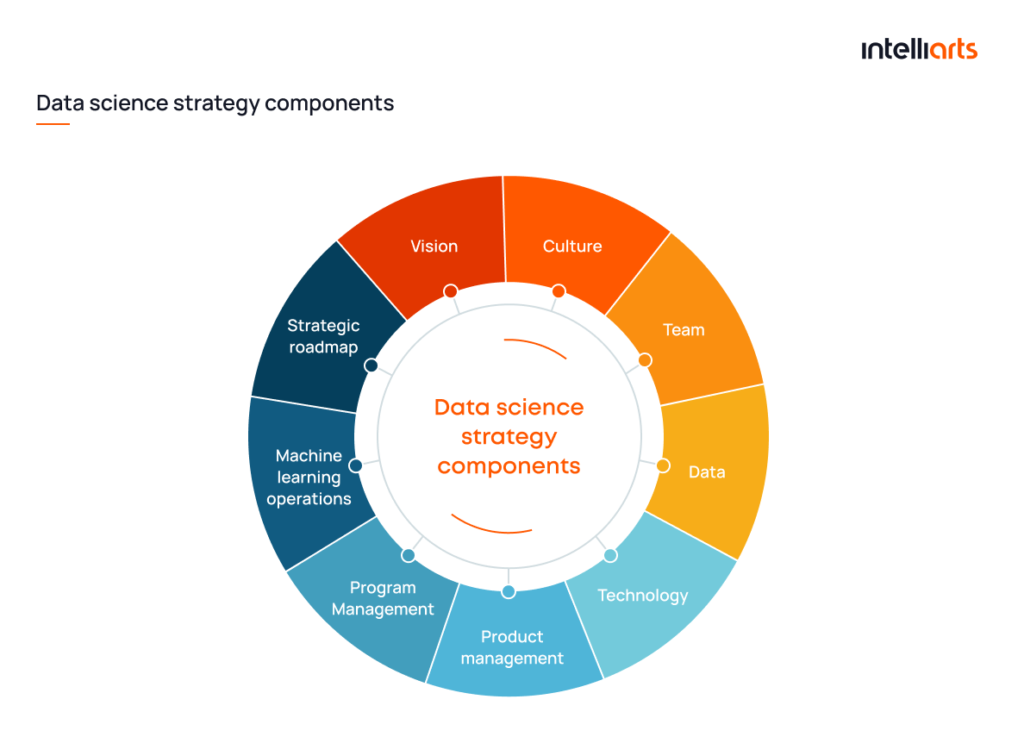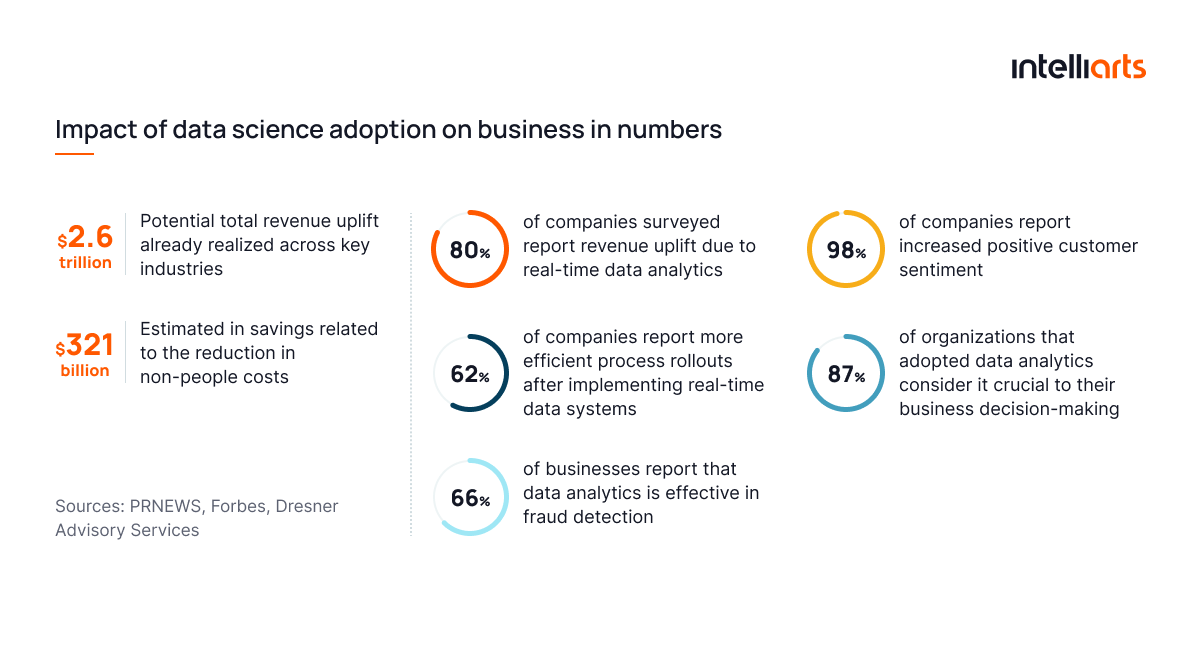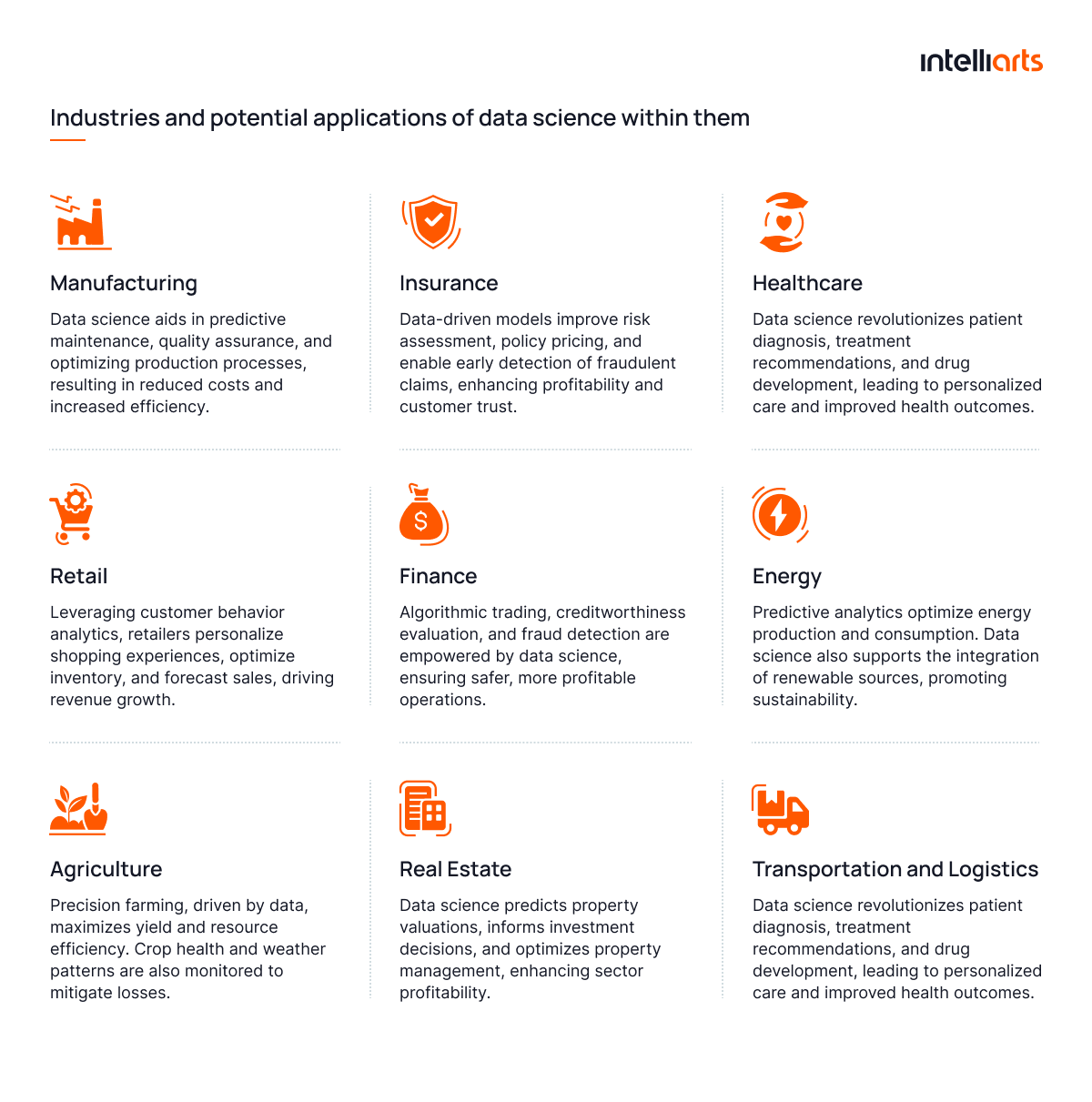How to use data science in business? With the software tools, methodologies, and capabilities it brings, data science can offer businesses a unique instrument to glean insights, streamline operations, and cultivate innovation.
According to the latest Polaris Market Research, today’s global data science platform market is valued at $95.31 billion and is projected to grow at an incredibly impressive CAGR of 27.6% by 2030. Likely, the trend will continue as data science-based solutions infiltrate businesses from different domains.
From this post, you’ll discover the value and impact of data science for companies and what are the top strategies for using this technology. Besides, you’ll get to know the components of a solid data science strategy and best practices for creating one. Examples of how data science transforms businesses are also included.
Importance of data in business
To begin with, the adoption of data science can notably revolutionize business in multiple ways. Digital transformation helps make better use of vast data generated through everyday operations. If utilized successfully, it can bring the following outcomes:
Improved decision-making
Probably the usage of data generates the most value when it impacts decision-making. By leveraging insights obtained through data science, businesses can now make choices based on concrete evidence rather than mere intuition. Alternatively, even if businesses used to exploit methods of data analysis, they can be notably enhanced and transformed, as well as largely automated, through data science approaches.
The detailed approach increases the likelihood of success, be it in launching a new product, entering a new market, or refining internal processes. In essence, data science provides businesses with modern-day analytical instruments needed to navigate an increasingly complex business landscape.
Enhanced customer insights
Understanding customers’ pain points is the cornerstone of any successful business strategy. After all, the opportunity to strike a chord with a potential buyer’s soul nearly guarantees sales. Data science plays a pivotal role in this by:
- Analyzing consumer behavior. Tracking purchase history, browsing patterns, and feedback to understand preferences.
- Predicting future trends. Anticipating what products or services customers might be interested in the future.
- Segmenting the market. Grouping customers by similar behaviors or preferences to tailor marketing efforts.
With such deep insights, data science for business can bring better customer experience, fostering loyalty and driving revenue.
Increased efficiency and cost savings
Efficiency in making decisions, running business operations, distributing resources, etc. often translates to increased profitability. As an example, retailers using data analytics experienced an average 10% reduction in costs and a 10% increase in revenue.
Companies can identify bottlenecks, redundancies, or processes that can be optimized by employing data science techniques, like:
- Classification
- Clustering
- Regression and time series analysis approaches
- Anomaly detection
- Visualization
This could range from automating mundane tasks to streamlining supply chain operations and optimizing logistics for faster delivery. The resulting operational improvements not only lead to faster, more efficient processes but also translate to significant cost savings, boosting the bottom line.
Better risk management and fraud detection
In today’s digital era, businesses are still vulnerable to various risks, especially financial health and cyber threats. Data science aids in:
- Predictive modeling. Forecasting potential areas of financial, operational, or other machine learning risk assessment.
- Enhancing security measures. Real-time monitoring, network analysis, geospatial analysis, anomaly detection, and other data science algorithms can help detect and counteract malicious activities. ML-based fraud detection also plays a crucial role in identifying and preventing fraudulent transactions.
The proactive detection and management of risks ensure that businesses remain secure, trustworthy, and compliant, safeguarding both their financial interests and reputation.
More innovation-driven products
Innovation is the driving force behind long-term business success. With data science, companies can:
- Analyze market gaps. Identifying areas where customer needs are not met fully.
- Test product concepts. Using data-driven feedback loops to help refine prototypes.
- Optimize product launches. Analyzing market response to product launches to adjust strategies accordingly.
By embedding data science into the product development process, businesses can create offerings that are not only unique, but also resonate deeply with their target audience. This will help to ensure market success and sustained growth.
If you’re interested in data science, you will find it useful to learn more about building a big data strategy in another of our blog posts.
Why are there still few businesses using data science
As Oleksandr Stefanovskyi, the team lead of the R&D department of Intelliarts notices from his experience:
“Many businesses aren’t using data science because they regard its adoption as an expensive and complex intervention. They might not have suitable, cleansed, and representative datasets or know how to use them, as 33% of firms reported that they don’t trust their data. Some staff members might resist using new technology, lack data literacy as only 21% of workers claim to be confident in their skills, or have difficulty estimating the ROI from data science implementation. Plus, finding skilled engineers to integrate the technology can be complicated. Lastly, some businesses just don’t know how the data science application in business can help them solve their business issues.”
We can claim that younger companies and startups can start utilizing data science faster, as they tend to make decisions swiftly. As for well-established businesses, it’s easier for them to get started with data science as they have resources to purchase data. They can also allow themselves to implement innovations for a longer period, and they often don’t heavily rely on investors.
From the Intelliarts experience, businesses that opt to adopt data science don’t regret their choice. Our customers who shared their experience with data science practices claim an increase in the number of successful business decisions and positive outcomes from them, including competitive advantage, increased revenue, enhanced sustainability, and more.
If you’re unsure where to start with the adoption of data science, don’t hesitate to reach out to qualified experts from Intelliarts.
Business sectors in which data science is a must-have
Data science can be used in nearly all domains since all businesses naturally deal with data, and, respectively, need to utilize it effectively. Here is a list of industries and potential applications of data science within them:
The listed industries express the varying rates of data science adoption. While finance and retail are among the most rapidly transforming niches, the agriculture and energy sectors tend to start utilizing data science at a slower pace.
7 applications of data science in business
Application of data science in business, both as a technological field and as a practical approach, offers methods and strategies to process data effectively, making it extremely valuable for commercial use. The 7 best data science strategies to improve business outcomes include the following:
Generate unique insights
Above all, business owners need to have insights that can help them understand their clients’ pains and desires. Some of the insights that can be generated include:
- Customer segmentation
- Customer behavior patterns
- Operational bottlenecks
- Market trends
- Product performance
- Supply chain efficiencies
- Employee productivity
This essential information will guide a strategy for satisfying clients in a way that’s beneficial for a business. In simple terms, insights can help to determine what services and products can be sold profitably.
Increase competitiveness and performance
In the data-driven world, those who harness data effectively often outpace their competitors. Data science tools and methodologies can benchmark your performance against industry standards. By analyzing this data, businesses can pinpoint strengths, identify areas that need improvement, and strategize accordingly. This proactive approach fosters a culture of continuous enhancement, making businesses more agile and robust.
Optimize and automate business processes
Operational inefficiencies can be costly. Data science enables companies to map out their entire workflow, identifying bottlenecks and inefficiencies. By leveraging algorithms, businesses can automate repetitive tasks, ensuring speed and accuracy. This not only saves time and resources but also allows human talent to focus on more strategic roles, driving overall business value.
Read also about predictive maintenance advantages and disadvantages for the manufacturing business.
Forecast the future of your business with patterns
Strategic forecasting can be done through the following approaches:
- Trend analysis. Predict industry shifts and adapt strategies timely.
- Seasonal forecasting. Anticipate demand during peak seasons.
- Consumer behavior prediction. Understand the future actions of customers.
By recognizing patterns, businesses can anticipate market changes, ensuring they’re always a step ahead. Predictive models can help strategize inventory management, marketing campaigns, and more.
Enhance the customer experience through personalized recommendations
In today’s digital age, personalization is key. Consumers are more likely to engage with brands that offer tailored experiences. Using data science, businesses can analyze individual customer behaviors, preferences, and purchase histories. Such analysis allows companies to make personalized product or service recommendations, fostering customer loyalty, increasing retention, and maximizing revenue opportunities.
Drive decision-making with data-driven market analysis
Here are some of the techniques you can use to drive decision-making using data science to solve business problems:
- Competitor analysis. Understand the strengths and weaknesses of competitors.
- Market segmentation. Identify and target high-value customer groups.
- Demand estimation. Predict and meet customer demand efficiently.
By conducting a thorough market analysis, businesses can make well-informed decisions. This data-driven approach helps in understanding market dynamics, spotting opportunities, and mitigating risks, ensuring more strategic and confident decision-making.
Identify and tap into new revenue streams using predictive analytics
Another data science application in business is providing an opportunity to predict future trends and spot opportunities before they become apparent. This might mean introducing a new product, entering a new market, or targeting a different consumer segment. By foreseeing these potential revenue streams, businesses can use market opportunities more effectively than their competitors. Or, detect potential risks and take action before they negatively impact the business.
Are you looking for a trusted provider to power up your data science project? Drop Intelliarts, the data science agency, a line.
Data science strategy components
One of the data science business applications is obtaining data and transforming it into useful knowledge includes several key components. See the infographic below to learn more:

Next, let’s get to know the best practices that can drive creating and executing a data science business strategy.
Best practices for a successful data science strategy
The mere adoption of data science isn’t sufficient. To truly reap its benefits, businesses must adhere to the following best practices that lay the groundwork for success:
- Align with the right vendor. Partnering with vendors who understand your business can greatly help in building the system for generating relevant insights and making efficient data-driven solutions.
- Gather and track the right metrics. Focus on key performance indicators (KPIs) that align with business objectives to drive meaningful change.
- Set use-case-driven goals. Tailor data science initiatives to address specific business challenges for effective and tangible outcomes.
- Demonstrate valuable results. Highlighting a clear ROI from data initiatives encourages stakeholder buy-in and further investment in data endeavors.
- Invest in continuous training and upskilling. Keeping teams updated with the latest techniques ensures adaptability and optimum use of data tools.
- Foster a collaborative environment between data scientists, IT, and business units. Integration of data scientists, IT, and business units streamlines operations and enhances the applicability of insights.
- Ensure data quality and integrity. Accurate, clean data is foundational to data science strategizing. It ensures the retrieval of reliable insights and fosters trust in decisions made based on them.
If you’re interested in learning ways to obtain clean data using data pipelines in business, read another blog post of ours.
It’s safe to claim that theory is hardly useful if it’s not connected with practice. In the next section, we’ll explore some data science implementation success stories.
Examples of how data science helps your business
Let’s review some of the success stories showcasing how the data science application in business can be truly beneficial:
Home and car insurance company
One of the data science examples in business is home and car insurance company. The challenge was to help an insurance company replace its inefficient system for communicating with leads with a custom predictive lead-scoring solution. It was intended to help the customer prioritize leads better, raise efficiency, and optimize the usage of the company’s resources.
The solution was a predictive lead scoring model capable of forecasting how likely the lead would buy an insurance policy. This was achieved by using gradient boosting techniques that enable the recognition of patterns in vast amounts of tabular data. The custom insurance software enabled the customer to cut off approximately 6% of non-efficient leads, which resulted in a 1.5% increase in profit within a few months. Now the customer leads by the probability of sales success.
Real estate business

The challenge was to forecast which householders would sell a residence prior to the listing of the property for sale. The customer was monitoring over 1400 property and demographic data attributes. It also possesses a massive dataset comprising over 60 million data records. In that regard, the customer required effective processing of the raw data.
Re-uploading data to Amazon S3 data storage, concluding data transformation, and establishing data processing with the assistance of AWS Glue constituted the resolution. Using the processed data, the predictive model can identify a minimum of 70% of homeowners who intend to sell their homes. This result is significantly higher than the industry average.
AirBnB

Users of AirBnB had difficulty setting prices for housing opportunities, which either left money on the table if priced too low or led to few bookings if priced too high. So, to keep the competitiveness of the platform at a superior level, AirBnB decided to apply data science.
To assist hosts in setting a competitive and optimal price for their listings, AirBnB developed a dynamic pricing model using data science. This model, known as “Smart Pricing,” takes into account various factors including time of year, listing location, local demand, nearby events, amenities provided, etc.
Final take
Using data science to solve business problems is always a wise choice. After all, it helps companies make the best use of their valuable asset — data. By exploiting data science business strategies, applications of data science in business, and best practices, including the development of robust data pipelines, you can transform the way decisions are made in the company, leading to better outcomes for the business.
If you intend to get started with data engineering consulting services or creating and executing a data science strategy, reach out to Intelliarts — a provider of IT services that has been on the market for more than 24 years. Our team of expert data scientists is ready, willing, and able to help your business stay ahead.
FAQ
1. How long does it take to gather information for a data science strategy?
Gathering data science business strategy information varies depending on complexity, data sources, and business goals. Typically weeks to months.
2. How to find and hire data science experts?
Identify the needs of your project, search platforms, vet qualifications, conduct interviews, and evaluate fit. Use platforms like LinkedIn or Kaggle. You can also apply for assistance from a data science service provider.
3. What are the challenges in applying data science to business?
It may be challenging to implement data science in business because of difficulty aligning objectives, data quality, integration issues, communication gaps, managing expectations, and demonstrating ROI.














